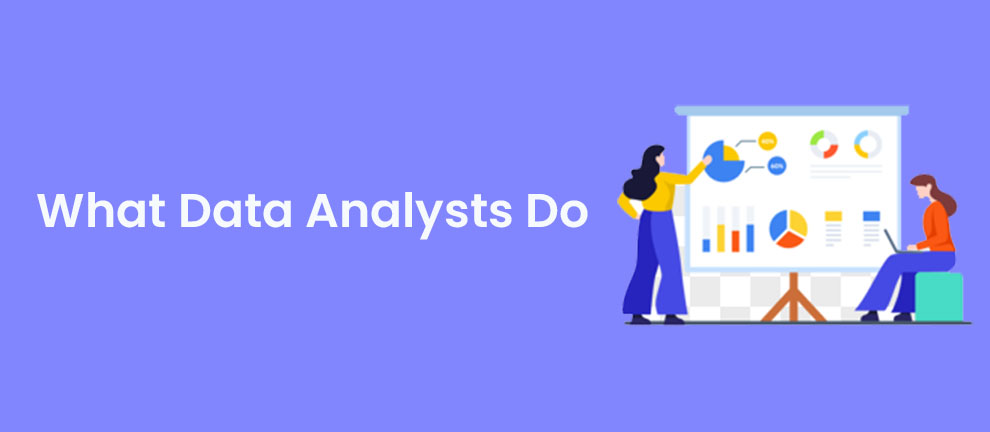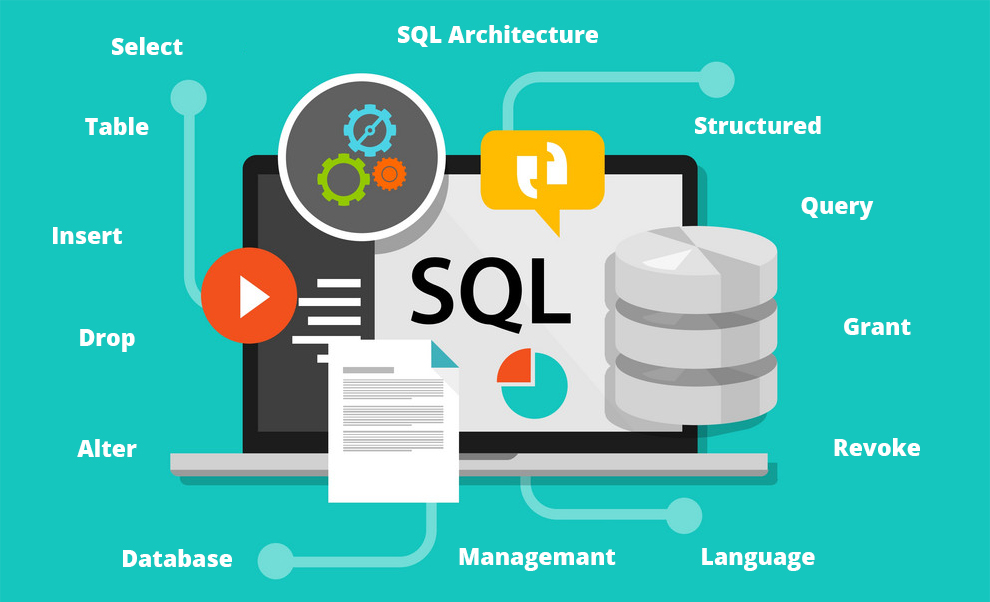According to BLS (U.S Bureau of Labor Statistics), jobs in the field of data operations including data analysis is expected to grow by 25% in a decade from 2019-2029.
Data analysts collect, analyze and interpret data for solving a wide range of problems in business. Organizations in all industries depend a lot on the data to make critical decisions in their business like new markets to capture, which new products to develop, where to make new investments, and so on. Knowing what does a data analyst do and how greatly it impacts the business, has made this role quite a popular one.
If you think you want to make a career in this field, our post will help you with everything you need to know about this profession. You need to understand how data analysts work, how you can prepare yourself for becoming a data analyst, roles and responsibilities, salary, etc.
Jump To
- What Do Data Analysts Do?
- Qualifications Needed
- Roles And Responsibilities
- Skills Needed
- What Does A Data Analyst Do In a Regular Routine?
- Career Paths
- Data Analytics Types
- Data Analyst Vs. Data Scientist
- FAQs
- To Sum Up
What Data Analysts Do?
Data analysts play an important role in an organization. They bring practical and theoretical knowledge together and identify the issues of the company that needs to be addressed. Their work allows company stakeholders, managers, and executives to make informed decisions.
Analysts collect data through surveys, software, and other tools of data collection and perform analyses and interpret information for critical decision-making.
While analyzing, data analysts take internal and external factors like the competitive market, internal and external business interests, and also the absence of data sets into the data-based recommendations that they make to the leadership.
So, by now, we hope you are aware of what exactly does a data analyst do. It is essential to also learn about the different teams present in companies to ensure their smooth running.
Many companies have created analyst teams including data scientists, database administrators, database managers, data architects, data engineers, data analysts, etc. They work at big investment banks, private equity firms, and mostly all big sized enterprises. They also work in finance, the healthcare data analytics domain, retail and marketing, credit bureaus, technology firms, and other industries.
In many companies, they are also called information scientists. These professionals work with the company’s proprietary databases. In government sectors, what data analysts do is data collection, mining, and analysis. Information scientists also have an important role to play in insurance and healthcare companies.
In technology companies, constantly new departments are being created to tackle new challenges and grab new opportunities. The data analysts who excel in their existing roles are allowed to lead when new departments are created. This provides data analysts with the opportunity to lead and take ownership of particular segments of the company.
At financial institutions, from entry-level roles, data analysts climb up to management positions. Once you prove yourself in managerial positions, you could be looking at a career as the vice president or department head of your company.
In a nutshell, what does it mean to be a data analyst is to take up raw data chunks for analysis and look for trends and insights within them.
What Qualifications Do You Need To Be A Data Analyst?
While an undergraduate degree, Master’s, or Ph.D. in Maths, Computer Science, or Statistics will certainly help you find good opportunities in the data analysis field, these degrees are not a prerequisite for becoming a data analyst. A certification is many times all that you need – again not mandatory.
If you graduate from a data analysis program with good grades and a high ranking in your class, you could easily find a job in an entry-level position.
Data analysts need to possess a dynamic skill set. What data analysts do is play with numbers. So, they should be good with numbers and handling large amounts of data. They should do well in multi-tasking, data programming and data flows. Data analysts should have strong presentation skills that are required for presenting their analyses regularly.
Roles and Responsibilities of A Data Analyst
The roles and responsibilities of data analysts vary according to the type of organization and how much has the business adopted data-based decision-making practices.
If you are interested in getting into this career and want to know what does a data analyst do day to day, read on.
Generally, the responsibilities of a data analyst include:
- Designing and maintaining databases and data systems including fixing coding errors and other data-related problems.
- Collecting data from primary and secondary sources, reorganizing the data to make it understandable by both humans and machines.
- Using tools to interpret data, paying attention to trends and patterns for analysis.
- When it comes to the question of what data analysts do? They prepare reports communicating trends, patterns, and predictions using relevant data for helping leadership make informed decisions.
- Collaborating with engineers, programmers, and leaders for process improvements, developing policies, and recommending system modifications.
- Creating appropriate documentation for allowing stakeholders to understand the process of data analysis and if necessary duplicating or replicating the analysis.
- Present the data visually or orally on a day-to-day basis.
What Skills Do You Need To Be A Data Analyst?
If want to pursue this career option, you should first learn what data analysts do and what skills are needed to do it right. Half of it we have covered, let’s talk about the second half.
We have listed here a few of the technical and non-technical skills required by a data analyst.
A. Technical:
- Some of the technical skills that a data analyst needs include:
- Knowledge of database languages like SQL, Python, or R
- Spreadsheet tools such as Google Sheets or Microsoft Excel and data visualization software like Qlik or Tableau
B. Non-technical:
- Successful data analysts possess mathematical and statistical skills for gathering and organizing
- Analytical mindset to analyze the data to bring out what the data is trying to show
- Numerical skills to draw meaningful measurable results from the data
- Technical soundness to present the finding to other team members
A Typical Day In The Life Of A Data Analyst
So, what does a data analyst do day to day?
A typical day in the life of data analysts starts with meetings with the analytics team to discuss the tasks and brainstorm possible solutions.
Firstly, they gather the data, then they clean it and finally they process the data. The process of gathering data is simple as the databases are most of the time easily accessible.
Now, the next part of cleaning the data takes a lot of time as a data analyst has to sift through the data and understand it, make corrections wherever needed and not include the data that is not needed in the analysis. Here understanding the data is very important as without that it is tough to proceed to the next step.
Lastly, comes the processing of data. This is where the programming skills are put to use along with different data tools. Using these tools helps data analysts to make projections and give their insights.
Career Paths for Data Analysts
There are many different roles that data analysts can play along their career paths. What exactly does a data analyst do in each role differs.
- Business intelligence analysts
- Compensation analysts
- Corporate strategy analysts
- Sales analysts
- Insurance analysts
- Budget analysts
- Social media data analysts
- Machine learning analysts
- Business product analysts
- Credit analytics
- Fraud analytics
- Actuary
- Web analytics
Data Analytics Types
There are four types of data analytics. Read on to know what does a data analyst do performing these different kinds of analysis.
a. Descriptive analytics
This type of analytics finds out what happened in the past – monthly revenues, quarterly sales, website traffic yearly, etc. It allows the organization to identify trends.
b. Diagnostic analytics
Diagnostic analytics takes into consideration why something happened by comparing descriptive data sets to identify patterns. This way it helps an organization determine the cause of negative and positive outcomes.
c. Predictive analytics
It determines the likely outcomes by detecting patterns in diagnostic and descriptive analyses. This helps an organization take proactive action.
d. Prescriptive analytics
This kind of analytics tries to identify what action to take. Though it enables an organization to address problems or be ahead of industry trends, it uses complex algorithms and advanced technology like machine learning.
What Data Analysts Do Vs. Data Scientist?
Although both the terms ‘data analyst’ and ‘data scientist’ are used interchangeably, there is a technical difference between both the terms.
The difference is in the roles they play.
The data analyst takes the data and analyses it for an organization’s growth. It lets the stakeholders make critical business decisions. This is a technical role that needs an undergraduate degree or master’s degree.
The data scientist works a step further. A data scientist sifts through the data that a data analyst creates and identifies weaknesses, opportunities, trends, and patterns for an organization. This role requires an education background in computer science, and math for making informed decisions.
In small organizations, sometimes data analyst takes on the roles and responsibilities such as decision making or predictive modeling data scientist.
FAQs
1. Does a data analyst require coding and what does a data analyst do with coding?
Ans. Data analysts require coding, but there is no need for advanced programming skills. You should master the basics of R or Python and also proficiency is needed in querying languages like SQL.
The basics of these languages are easy to learn. Some employers may ask for Julia or SAS. It all depends on the industry you work in.
2. What tools do data analysts use or must know of?
Ans. The most essential languages they must know are R and Python. Knowledge of SQL consoles, SAS, data modeling tools, ETL tools, automation tools, unified data analytics engines, and spreadsheet applications are also important.
3. How would I know if data analysis is the right job for me?
Ans. If you are wondering whether you have the qualities needed for this profession, you can judge for yourself if you have the following qualities:
- Curiosity and inquisitiveness
- Analytical thinking
- The logical approach to work
- Problem-solver
- Good with numbers
- Interest in business strategy
- Affinity for statistics and numbers
- Ability to present complex issues in a user-friendly manner
4. How much do data analysts make?
Ans. IBM estimated that entry-level data analysts make an average salary of $60,000 per year, however, senior position professionals can receive a salary exceeding $135,000. It is expected that this career has a growth rate of 22% through 2030.
5. Is data analytics a good career?
Ans. Yes, data analytics is a good career option. There are plenty of jobs in the data analytics sector. The demand is strong and the supply of data analysts is limited. So, data analysts command huge salaries. The career paths within the industry are also abundant and it offers a wide range of opportunities across industries. All these reasons make this career a perfect option.
Conclusion
Being a data analyst can open doors toward many career paths. We hope that now you have clarity on what data analysts do. And your ride to being a data analyst becomes a little smoother.
Professionals who start their career as data analysts many times go on to work as information scientists, data architects, financial analysts, and so on. All these roles also come with a substantial increase in your pay. They are in high demand too.
The role of a data analyst is just a stepping stone for other senior-level data-based jobs.




